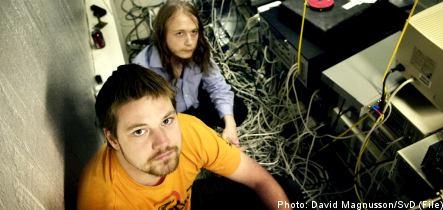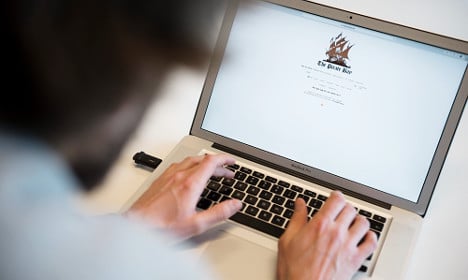Fredrik Neij appeared to be nervous at the start of his testimony, stumbling over his words as he read through a prepared statement from a handheld device he took with him to the witness stand.
“I saw it as a huge challenge to be allowed to play with The Pirate Bay,” said Neij, according to the Svenska Dagbladet (SvD) newspaper.
“I never thought The Pirate Bay was illegal; we checked with lawyers both before and after the law was changed.”
Following his statements, Neij was challenged by prosecutor Håkan Roswall about emails between him and an Israeli not charged in the case.
The Israeli is believed to have managed ad sales for The Pirate Bay, and the emails presented by Roswall deal with registering a company in the British Virgin Islands, according to a transcript of the proceedings taken by the Dagens Nyheter (DN) newspaper.
Neij responded that he only dealt with emails related to technical matters, something about which Neij claimed the Israeli had little knowledge.
“How is his knowledge of computers,” asked Roswall.
“He knows a little,” answered Neij.
“Like what?”
“Windows,” replied Neij, prompting an outburst of laughter from the nearby public gallery.
Roswall continued, attempting to determine who exactly was responsible for The Pirate Bay’s operations.
“We’re a hobby site where people go in and do things when they think of them,” said Neij, who said that he became involved in the site’s technical operations in early 2004.
Roswall then asked if Neij was aware that the site contained torrent files that pointed to copyright protected materials.
“Nothing of which I was especially aware. Do you mean generally speaking or just what’s related to the indictment?” Neij responded.
“Generally,” said Roswall.
“In that case I choose not to answer,” said Neij.
But then Roswall produced a transcript from a police interrogation in which Neij said that “there are links to copyrighted material.”
“How did you know that? In what way? You must have discovered it at some point,” said Roswall.
“It must have been those ‘legal threats’ which refer to American law,” said Neij, adding that he wondered why the prosecutor was asking questions to which he already knew the answers.
Neij also explained that The Pirate Bay has repeatedly checked with legal experts to verify the site wasn’t breaking any laws.
“With whom [did you check]?” asked Roswall.
A law student who raised the matter with one of his professors, answered Neij.
Neij was then questioned by Peter Danowsky, who represents the IFPI recording industry trade group, who questioned Neij about the ownership of The Pirate Bay.
“I’m the owner of the domain names because I had money when they were registered,” said Neij.
Danowsky pointed out that the contract which Neij signed says that he is responsible for the operations of The Pirate Bay.
“But I didn’t read it,” said Neij.
Danowsky then pressed Neij about a speech he gave in connection with the re-launch of The Pirate Bay several days after police had raided its facilities in 2006.
In the speech, Neij said that, “over the last two years we’ve built a file sharing empire the likes of which the world has never seen before. Through the years we’ve received countless threatening letters and each one has received a suitably insulting answer.”
Neij admitted he gave the speech, but claimed not to have written it himself.
“I just read the text which someone at the Pirate Bureau had read,” he said, referring a pro-file sharing advocacy group in Sweden.
Danowsky also asked Neij about his views on the rights of copyright holders.
“I couldn’t care less. I do this because it’s really fun to run a large site,” said Neij.
After lunch, Gottfrid Svartholm Warg took the stand to answer questions about how the name The Pirate Bay was chosen.
“We aren’t really sure who it was,” said Svartholm Warg, prompting Roswall to inquire what the name meant to him.
“It’s a really strong brand,” he replied.
Roswall then focused on many of the mocking responses posted on The Pirate Bay to letters written by copyright holders and their representatives admonishing the site’s operators to remove copyright protected links from The Pirate Bay.
Svartholm Warg admitted to authoring some of the responses to what he called “idiotic emails” and that in every case he instructed those who complained to contact the people who uploaded the copyrighted material in the first place.
“As far as I know they never did,” he said, emphasizing once again that The Pirate Bay’s contents are user generated and that the site’s administrators only removed torrent files which didn’t match their descriptions.
Monique Wadsted, who represents US film companies in the case, later questioned Svartholm Warg about his supposed technical wizardry, asking him what he thought about being described as a “computer genius”.
He admitted that he had “certain technical knowledge” but refused to comment on the term “computer genius”.
“This isn’t the right forum to post my CV,” he said.
Svartholm Warg asserted once again that the majority of contents found on The Pirate Bay link to material not protected by copyright.
According to him, the 33 works included in the indictment were uploaded by professional “pirates” who “hate The Pirate Bay”.
Svartholm Warg added that it possible to find more torrent files using Google and other search engines, and with the tracker Mininova, than with The Pirate Bay.



 Please whitelist us to continue reading.
Please whitelist us to continue reading.